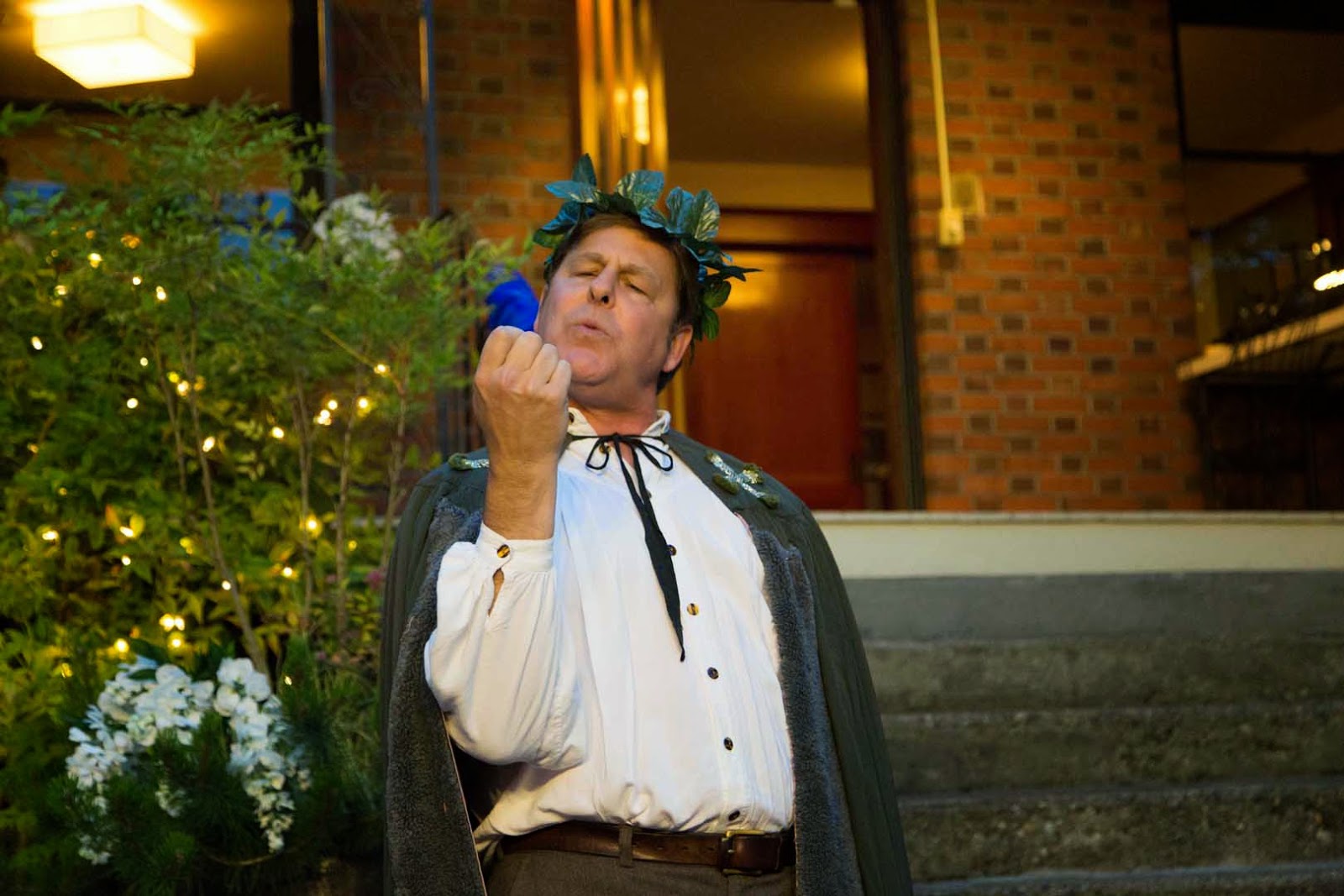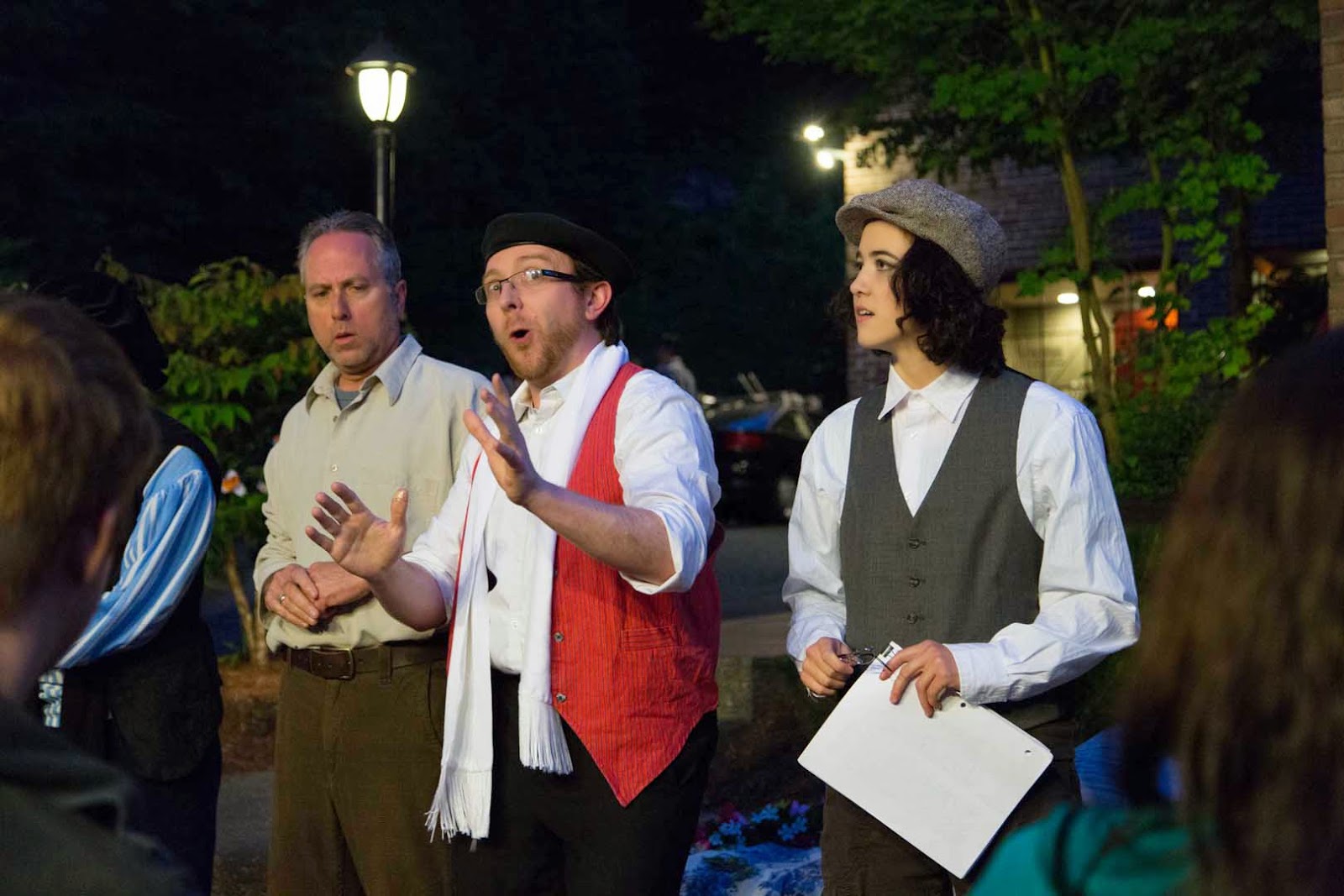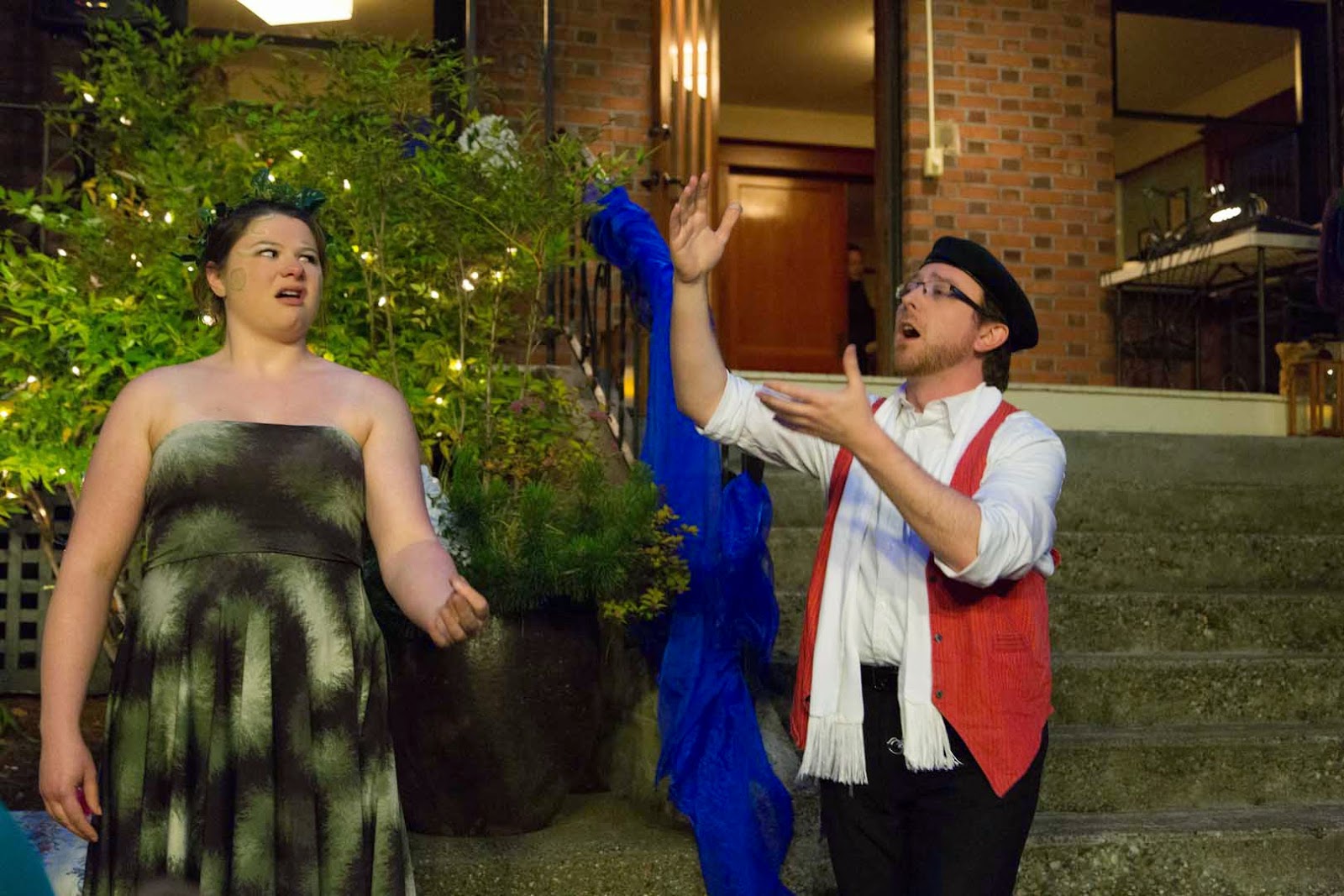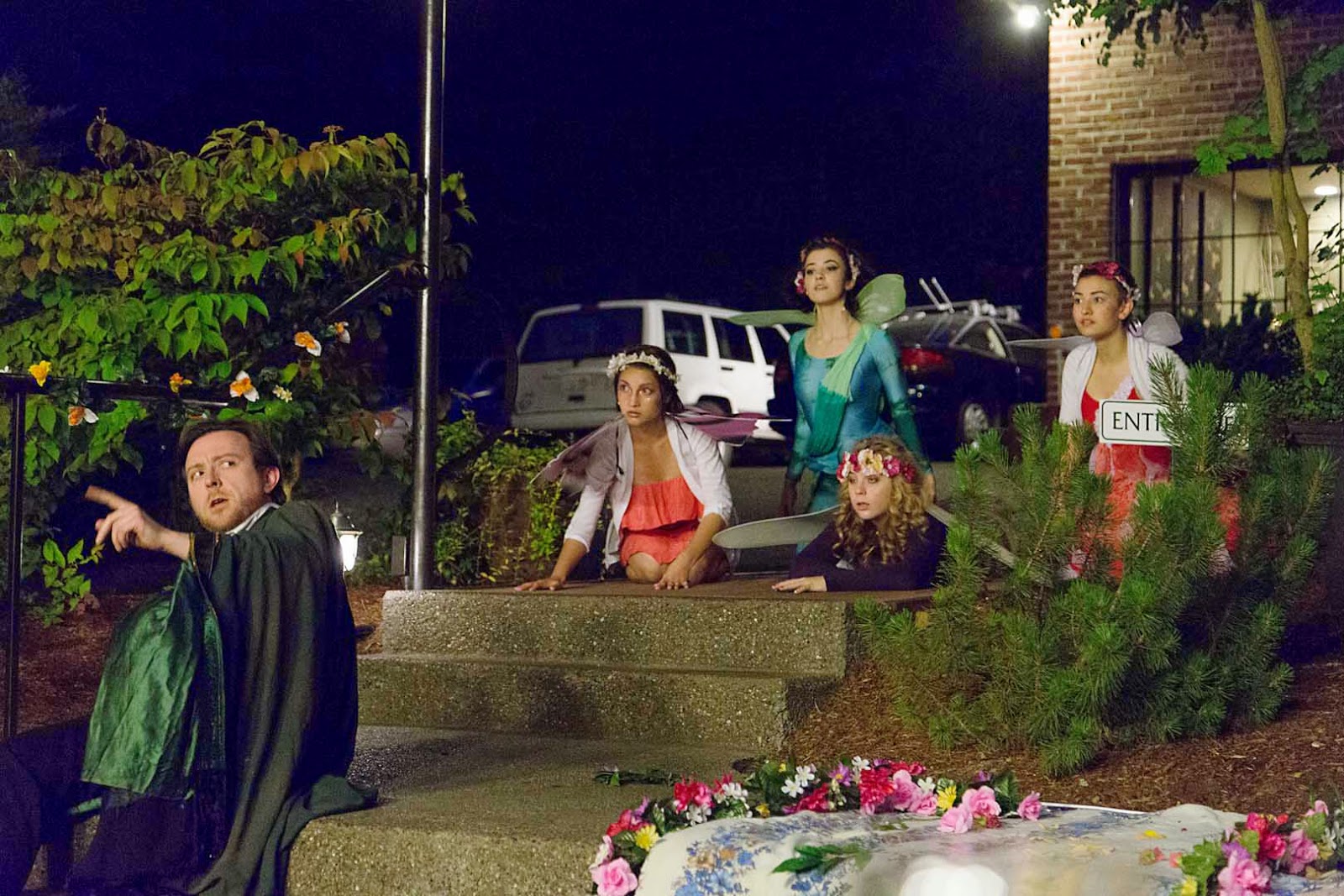Duke Theseus, soon to be married to Hippolyta, must settle the matter of Egeus' daughter, who against her father's wishes to marry Demetrius, truly loves Lysander. The law of Athens dictates that she must obey her father or die.
The course of true love never did run smooth.
Forbidden to love, Hermia and Lysander decide to run away together.
Helena wishes she were fair as her friend Hermia, to win the heart of Hermia's suitor Demetrius. Lysander and Hermia confide in her that they will run away from Athens to live in freedom from the law. Hoping to gain Demetrius' favor, Helena runs to tell him of Hermia and Lysander's flight, then follows him into the woods.
A band of Athenian working men prepare a play, the "lamentable comedy of Pyramus and Thisbe," which they hope to perform for the Duke's wedding party. Amateur (mostly incompetent) actors, they look to make names for themselves if they are chosen to entertain the court.
Peter Quince calls his actors to give them their parts.
Robin Starveling the Tailor, Flute the Bellows-Mender (Thisbe), Nick Bottom the Weaver (Pyramus), and Snug the Joiner assemble.
The "lead actor," Bottom takes center stage in telling how the play should be organized and how actors should play their parts.
...Or how well he would play their parts for them!
Peter Quince intervenes: "You can play NO PART but PYRAMUS."
To Snug, who fears he will not remember his lines, Peter Quince reassures that he may improvise his part, for Snug will play the lion, and "it is nothing but roaring."

Bottom jumps in eagerly to show everyone his own grandiose lion's roaring, but Peter Quince remains firm, soothing the lead actor that he is the most gentleman-like and therefore must play the lead role of the lover Pyramus. That settled, scripts are handed out and the players go to learn their parts. The wedding is tomorrow! They will rehearse outside Athens...in the woods.
A fairy appears in the night!
Puck, wanderer of the night and master of mischief making, meets the fairy and they discuss the strife going on between their lord and lady, the Fairy King and Queen.
The Fairy Queen has a boy in her charge with whom she will not part, but Oberon wants to make the boy one of his knights.
In their argument, it is revealed that the discord between them is the result of each one's jealousy. Titania believes Oberon to favor Theseus' bride-to-be, Hippolyta, while Oberon maintains that his queen harbors affection for mortal Theseus.
The fairy land is upset by the discord between its rulers. The Fairy Queen insists they make it right, so that the land and its creatures may return to normal.
Oberon agrees...if she would just give him the boy.
Titania refuses.The boy was the son of a mortal woman of the fairy queen's Order, and Titania vowed to keep and protect him. Calling her fairies, she leaves
Oberon ponders how to resolve the problem, perhaps by mischievous means. Puck, the spirit of all things mischievous, joins Oberon in a plan to take the flower of Cupid and anoint Titania with its magic juice so that the first thing she sees she will fall madly in love with.
While his queen is thus engaged, he will steal the boy, then use the flower of Diana to undo the love spell from Titania.
But then, two mortals burst into the woods. Demetrius, followed by Helena, searches for the runaway Hermia. Helena declares her love for Demetrius, who scorns her and leaves her. Lamenting this rejection, Helena pulls herself together to rather die than leave Demetrius' side, whether he loves her or not. Invisible to mortal eyes, Oberon observes the exchange, takes pity on Helena, and orders Puck to make the Athenian gentleman to fall in love with the Athenian woman.
Retreating into fairy bowers, the fairy queen bids her fairies sing her to rest, then leave her to sleep.
Oberon sneaks the love potion onto her eyes.
Lysander and Hermia, stopped to rest in the woods, having lost their way, are found by Puck, who mistakes them for the Athenians Oberon bid him to magick. Puck charms Lysander with the flower.
Helena finds Lysander, who wakes and promptly falls head over heels in love with her! Convinced that he is only mocking her, Helena runs away, pursued by amorous Lysander. Then, Hermia awakes and, finding Lysander gone, vows she will find him or death immediately.
Fairies watch, unseen by mortals, as the players approach to rehears their performance, coincidentally right near their fairy queen's sleeping place.
Bottom has several issues with the material of the play, thinking it too violent for the court ladies if he must draw his sword to kill himself (as Pyramus). Distraught and confused, the players don't know what to do. Luckily, all along, Bottom has the solution, in the form of a prologue in which all the actors are declared to be just actors, not the real characters or creatures, to spare the audience from actually believing they are what they are pretending to be.
In fact, the inanimate objects that the play requires - the moon and the wall - can be played by actors who will enter and say that they will be playing or presenting moon and wall!
Puck amused by the players, watches (and participates) in their proceedings. Here, the wall presents the "chink" through which Pyramus and Thisbe, the tragic lovers, must whisper.
Bottom hams it up as he rehearses Pyramus.
Flute, beard and all, stumbles through his lines and cues as the lovely Thisbe.
Puck catches Bottom after one of his exits and gives him a literal ass' head without Bottom realizing it.
Puck and the fairies watch as the players, horrified at Bottom's transformation, flee the woods.
Right on cue, the fairy queen awakes and sees Bottom.
The fairies react to seeing their queen bestow love and favor on the donkey-headed creature.
Puck, very pleased with the night's events, rushes to tell Oberon.
Interrupted by Demetrius and Lysander, who have found each other in the woods, Puck and Oberon watch as Lysander renounces his love for Hermia.
Intrigued by the lovers' predicament, the fairies watch from the trees.
Finding Demetrius asleep, Puck puts the flower potion on him to fall in love with Helena. When he does, both men follow Helena, while Hermia discovers that Lysander hates her and loves Helena.

Hermia turns on Helena, who in turn insists that everyone, including Hermia, is mocking her.
Having both been magicked by Puck, Demetrius and Lysander both vie for Helena's love.
Furious, Hermia tries to attack Helena, whose charmed lovers protect her.
The cause of the lovers unfortunate tangle is Puck. Oberon is not pleased. He and Puck must cast one more spell with the flower to make Lysander love Hermia again.
Creating a sleeping darkness to send the lovers to sleep, Puck makes all right by charming Lysander.
The fairies spirit them back to the edge of the woods, then dance in the forest.
Meanwhile, the fairy queen fondles her new love...
...to the fairies amusement
Oberon releases her from the spell.
Titania insists that he tell her how it came to be that she was sleeping with a mortal ass. They walk off into the moonlight.
On the eve of their wedding, Theseus and Hippolyta spend their time together.
But they come upon the lovers just outside the woods.

To Egeus' displeasure, he sees that his daughter is with Lysander and Demetrius is with Helena.
Honoring their love, Theseus decides to have mercy and invites the four lovers to Athens where everyone will be wedded.
Gloomy and despondent, the players see their future fame and fortune disappear with their lost lead actor, Bottom, just as they were sure to go to glory with their performance before the Duke. Just then, Bottom returns, having awoken and decided that last night had been a strange dream. Excitedly, the players go off to prepare to present their play.
Impatient with the long hours of the evening, Theseus calls for the master of revels.
There is a list of choices for entertainment.
Though Philostrates is unimpressed by the amateur actors' "Pyramus and Thisbe," the Duke is interested to see what they can do, and chooses their play.
Egeus watches, still resentful that his daughter didn't marry according to his plan.
Theseus calls for the actor presenting the prologue to approach.
The wall that parts Pyramus and Thisbe.
The chink
Lover's sighs as Pyramus enters as speaks his opening speech.
Thisbe longing for her lover, Pyramus.
The lovers Pyramus and Thisbe agree to meet by moonlight. The actor presenting moon smiles down from above.
Lion enters to explain to the ladies that he is only a man playing a lion.
This lantern is the moon.
Thinking the lion killed his Thisbe, Pyramus stabs himself. "Now die. Die. Die. Die. Die. Die."
Thisbe tragically finds her dead lover and kills herself too.
As soon as the applause starts for the end of the play, the two actors leap to their feet. Bottom asks if the audience might like to see a dance or hear an epilogue.
But the clock has struck midnight. The court goes off to nightly revels. It is fairy time.







































































































No comments:
Post a Comment